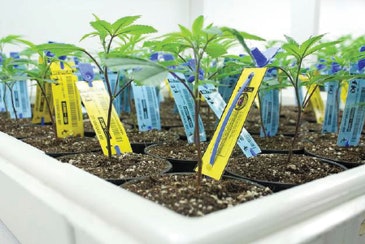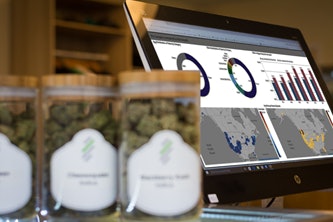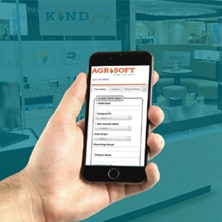
UPDATE: On May 31, the Washington State Liquor and Cannabis Board selected Franwell's METRC as the vendor for the state's marijuana traceability market. Click here for more.
Washington, one of the first states to adopt a mandatory seed-to-sale inventory-tracking system, is moving away from BioTrackTHC this year, with a new contractor expected (at press time) to be named as early as late May, following persistent gripes about the leading software provider’s functionality.
BioTrackTHC was adopted by the Washington State Liquor and Cannabis Board (WSLCB) in the fall of 2013, and as of February 2016 was serving five state governments and more than 1,600 businesses, according to Forbes.
The departure is a major shakeup for the inventory-tracking sector and will fundamentally change how many Washington growers spend their time and transfer compliance data to the state.
State officials say they’re looking for a more powerful, agile and user-friendly system and have offered a $3 million contract with a breakneck turnaround time by the end of October, when BioTrack’s contract expires.
With an announced victor expected just 20 days after bidding ended, industry leaders are concerned about a speedy transition, with BioTrack warning of a potential lapse in compliance, and businesspeople seeing that as an alarming and real possibility.
“I have started thinking the solution might be worse than the current terrible [situation],” says Jeremy Moberg, owner of CannaSol Farms in Washington.
“Right now we’re in this position of ‘holy shit,’” he says. “I have my serious doubts about the timeline. And everyone does. It’s going to be disruptive to the market. How disruptive, I don’t know.”
Moberg, president of the Washington Sungrowers Industry Association, should know. He sits on a traceability working group empaneled by the WSLCB.
Susy Wilson, owner of W.O.W. Weed, helped rally opposition among growers to what she described as BioTrack’s clunkiness and the quality of its customer support. But she’s also concerned.
“I’m still not a fan of BioTrack,” she says, but she’s worried a mad dash to implement a new system will lead to more functionality issues.
While BioTrack’s system does not allow non-compliant data to be submitted, some other systems do. The fear, according to Wilson, is that no guardrails equals steep fines for minor mistakes.
Wilson, who also founded the Cannabis Farmers Council, says that without a system that doesn’t allow non-compliant data to be entered (meaning: avoiding user error on the platform), she has visions of a $2,500 fine here for sending 9 grams of sample instead of 8 and a $2,500 fine there for accidentally making a batch of more than 5 pounds. Seemingly minor violations are “just so easy to do,” she says, and there are discussions of the new system allowing non-compliant data to be submitted.
Brian Smith, communications director for the WSLCB, says the state is trying to find “a traceability system that works for us and allows our licensees to operate within compliance.”
Smith says the state expects to have settled on a new contractor on May 23 (after this issue goes to press), leading to some speculation that officials are leaning toward one candidate.
The Contractor Core

The fight for Washington’s contract has pitted players with different comparative strengths and weaknesses against each other for the lucrative deal.
BioTrack says that the complaints of a few about its software and customer support attracted outsized and unfair attention.
In May, the Florida-based company announced it had won a contract to manage seed-to-sale tracking for Delaware’s medical marijuana program.
And as of publication, BioTrack held four other state contracts—with Illinois, Hawaii, New Mexico and New York—not including Washington, where it declined to submit another bid.
Metrc, the tracking system created by another Florida-based company, Franwell, runs Colorado’s tracking system and also has contracts with Alaska, Oregon, Maryland and Michigan.
Metrc submitted a bid in Washington, and while its user interface doesn’t have a bad rap, the company’s RFID tags cost companies nearly 50 cents per plant, attracting opposition from some end users since they would have to pay the cost as part of the mandated state program.
MJ Freeway, based in Denver, has contracts with Nevada and Pennsylvania, but is recovering from a disruptive January cyberattack that temporarily paralyzed the system and destroyed some user records.
A fourth state-contracted system, Agrisoft, offered by Los Angeles-based KIND Financial, is the new kid on the block. It is backed by Microsoft, but so far has acquired just one state contract: Rhode Island.
“This is going to be a global industry,” says David Dinenberg, CEO of KIND, which couples inventory tracking with banking-access services and currently has sold its Agrisoft software to more than 200 customers for between $399 and $699.
“Our company’s approach is, ‘It’s a marathon, not a sprint,’” he says. “The second go-around for a lot of these states is going to be easier.”
A dark horse could emerge in Washington, such as a business that does not specialize in cannabis, or a firm serving other regulated industries like tobacco or pharmaceuticals.
Efficiency, Efficiency, Efficiency
Ask almost any inventory-tracking company about their products and they will tell you about the importance of regulatory compliance and a safety net for product recalls, and then dive into an oral essay on how their product can transform a business.
Most cannabis-tracking firms—with the exception of Franwell, which hawks Metrc exclusively to states—offer, directly to businesses, paid products that plug into state systems, transferring compliance data while improving efficiency.
In Washington, many of these are refugees from the free BioTrack software available to growers, processors and dispensaries.
Wilson says a recent survey found many Washington growers still use BioTrack’s free version, unable to afford something better. But she turned to WeedTraQR for third-party software.
The company serves only growers, and WeedTraQR founder David Busby says 98 cultivators are paying regular monthly rates of $120 to $420, with about 40 outdoor grows using the service a few months a year. Most users are in Washington, with a handful in other states.
Busby, who worked at Microsoft in the '90s, says he views BioTrack’s paid version as his company’s current head-to-head competition in Washington. His company’s software is in the cloud, he notes, while some others are not.
Serving the other half of the cannabis industry, Ben Curren, CEO of Green Bits, has 650 dispensary clients in Alaska, Colorado, Oregon and Washington, and processes about $1.4 billion in annual sales while sparing businesses tedious tasks like updating online menus.
“A typical store in Washington spends about two hours a day doing that,” Curren says. “Since we have all their inventory electronic, we created an automatic menu publishing platform.”
Curren says his biggest customer does about $2 million in business a month and switched to his platform for speed, and says the company’s tablet “register”—with anywhere from one to 10 in a shop—is a key distinction from other offerings.
Green Bits’ register is found in a majority of stores in Washington, with a growing footprint in Alaska, Colorado and Oregon, Curren says.
“As the markets become state regulated, you get a lot more capital and a lot more competition and a lot more scale that’s possible. Because of that, running a dispensary is becoming more and more sophisticated,” he says."
We built a native cash register, so it’s not a website. … We’re a lot more like a grocery store,” he says. “Inside the barcodes we hide all of the inventory information.”
Still, MJ Freeway—boasting a massive 1,500 licensee base and $5 billion in sales processed—continues to be a leading third-party option in addition to its state contracts.
Heather Smyth, product marketing manager at MJ Freeway, says the company aims to have an easy-to-use product backed up by a responsive customer support team.
“It’s a bummer that we have to keep talking about” the January cyberattack, Smyth says. She sees the new Pennsylvania contract, which will be operated with cooperation from Oracle, as a sign the page is turned. “The fact we still have such a significant share of the market is huge.”
Smaller firms, however, are working to chisel away at industry leaders.
Flowhub, for example, touts as a major selling point its ability to allow businesses to aggregate data easily across grows and dispensaries, founder Kyle Sherman says. While working as a compliance officer in his mid-20s in Colorado, Sherman says he was a BioTrack customer, but believed that his new company “could save people a ton of time and money.”
Flowhub, now with about 300 clients, sells handheld devices that run a variety of apps able to scan RFID tags in a grow and driver's licenses in a dispensary. The company recently opened its platform allowing outside parties to add their own apps.
“A lot of our customers are vertically integrated. They own massive grow facilities and have 20 locations,” Sherman says. “In Flowhub you can run your business like it’s an entire industrial process, just like Target does.”
Sherman likens third-party integrators only serving part of the market to iPads, and his company to a full-service laptop. “They do different things,” he says.
Moberg, who works to educate consumers about quality, sunlight-grown products, also takes a different approach to third-party software: He builds it for himself.
Though Moberg still pays for BioTrack, he tells everyone who will listen that he hates that you can’t adjust column width or easily sort items. He still uses it because it’s not in the cloud, he says, and his in-house software uses information in its tables, along with additional data, to print labels or perform other functions, like selecting specific strain information based on properties.
Moberg also is preparing to launch an online ordering system for retailers and says he’s spent about $50,000 on his software fixes.
He feels strongly that the state should not allow its new vendor to offer paid third-party software, which he feels could lead the new vendor to not update the free version, putting even more financial burden on some struggling businesses.
“The biggest reason we ended up in this situation is we allowed the vendor who won the state contract to also participate in the third-party market,” he charges.
Battle of the Basics

Some debates are likely to continue for a while among tracking firms and their users, most notably whether barcodes or RFID tags are preferable.
Denholm of Franwell says Metrc RFID tags allow inspectors to breeze through a grow facility without having to touch plants.
But Busby of WeedTraQR says RFID tags aren’t environmentally friendly. Moberg says he’s tried RFID tags and found they don’t work well. Wilson, meanwhile, says many growers fear the price.
“A lot of businesses think [having RFID tags] is essentially a way for us to make money, and nothing is further from the truth,” Denholm says. “Is an RFID tag more expensive? Absolutely it’s more expensive. But you’re talking about a 45-cent tag on something that’s worth $1,800.”
“If you look at a typical barcode, you have maybe a 4-inch scan range. With RFID you can scan from 4 to 10 feet away,” he adds. “I always explain this to [the] industry: Do you really want a state official going in, pulling out your plants and scanning barcodes? And the answer uniformly is no.”
Smyth of MJ Freeway says, “Barcodes give you more flexibility,” and that although “there are pros and cons to each ... in our opinion, barcodes have been just as effective and less expensive.”
Moberg’s preference is a company that offers a dynamic barcode that allows for attribution of various bits of information to the code, rather than a simple identification, which could be a shortcut around having to create new codes for batches.
What’s Ahead
With lucrative state contracts expected to continue rolling in, and with thousands of potential deals in the field, competition is fierce.

Though a leader of the company was unavailable for an interview, BioTrack’s outside PR representative Cynthia Salarizadeh offered tough words for Washington.
“What they’re asking for doesn’t meet the Cole Memo,” she asserts, saying the state may see “a big security nightmare” with no functioning system when BioTrack’s contract ends in October. “Because they’re asking us to be non-compliant, that’s a nightmare for us. Why would anyone do that?” Salarizadeh asks.
Smith of the WSLCB, however, says, “It’s time for an upgrade.”
Among other improvements, he foresees “enhanced information system support of enforcement and compliance activities, including supply chain reporting and monitoring, minimizing the potential for product diversion to ensure compliance with the Cole Memo.” With a better system, Smith says, state examiners “will have more time to perform their chartered compliance and regulation functions."
Still, skepticism abounds.
“Whoever bids on it, it’s going to be a mess; that’s a complicated recipe,” Busby says, listing the various requested integrations and improvements.
On reflection, he adds, “Three million bucks seems what it may take to get this system to go.”














